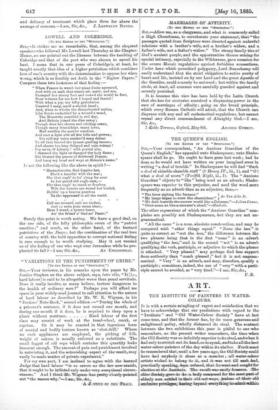- THE QUEIEN' - S ENGLISH.
rro THE EDITOR OF THE " SPECTATOR." _I SIR,—Your correspondent, "An Anxious Guardian of the Queen's English," has appealed unto Shakespeare ; untoShakespeare shall he go. Ile ought to -have gone last-week ; had he-done so bewould not have -written on -your imagined error-in -writing "a deal 'oftrouble." In 'Shakespeare he-will find "Such a-deal of skimble-skamble staff " (1 Henry IV., iii., 1), and "0 L what a deal of-acorn" (TweYth Night, iii., I). 'The "Anxious Guardian" objects-to' like" being used as an adverb ; Shakeepeare-was superior-to this -prejudice, and used -the -word more frequentlyas an-adverb than Its an 'adjective, thus,—
"The lover -sighing like furnace:"
„ 1 As Y ea Like It "My langsp began to-crew like chanticleer.
"dio doth,bestride thonarrow world like aColossas."-,Jutiusansar.. "Over-come as.likeur summer's cloud."—Macbeth.
Theother expressions of which the "Anxious Guardian" complains .are possibly not Shakespearean, but they are .not ungrammatical.
"All-the same " is a mom. absolute oonstruction„and may be compared with "-ether things 'equal." " None the -less "As quite as correct .as "mot .the -less," the difference 'between thetwo phrases being that in the _first "-none" is an 'adverb qualifying "the dess,"/and in the second " not " is an adverbqualifying the verbrpartieiple, or adjective to/which the phraseis -attaabed. "Very pleased" may ;perhaps .find -less eupport from -authority than ".muoh pleased ;" /but it is soot tingramenatioal. "Very "As an adverb, and-may, therefore,.qualify participle ; -sometimes,indeed,-the use of "very "-within parti-ciple cannot be avoided, as "very tired."—I am, Sird&c.,
F. R.


































 Previous page
Previous page